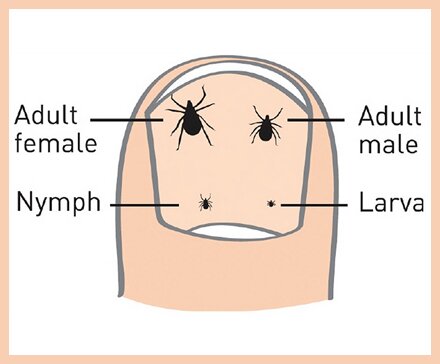Don’t get ticked off. Beware of Lyme Disease!

May is Tick Awareness Month
Don’t get ticked off. Beware of Lyme Disease!
What is Lyme Disease?
It is a bacterial infection passed to humans by the bite from a tiny tick no bigger than the size of this full stop . If not diagnosed and treated early it can cause devastating symptoms and in some cases can be fatal. Anyone walking in the outdoors or handling pets is at risk. But if the infection is recognized early enough and correctly treated with antibiotics, there is a good chance of recovery.
What are the symptoms?
50% of people bitten will develop a ‘bull’s eye rash’. Initial symptoms are a flu-like illness, fever, chills, headache, sleep disturbances, pain in muscles and joints, unusual tiredness, loss of appetite, swollen glands, sight and hearing problems, dyslexia.
If left untreated symptoms can develop into facial paralysis, arthritis, m.e., m.s., mnd, loss of reflexes, heart problems, hepatitis, seizures, facial palsy, tinnitus, double vision, occasionally blindness, memory problems, hair loss and behavioural changes, bladder problems, weakness in one or more limbs, paralysis, dizziness, breathing difficulties, dementia, memory loss, psychiatric problems, meningitis, encephalitis and problems with balance.
As a result of the above various symptoms, Lyme Disease is often misdiagnosed.
How to avoid getting bitten
When outside it is best to wear light coloured fabrics as it is easier to spot ticks. Wear long sleeved shirts and trousers tucked into socks. Use an insect repellent effective against ticks: there is clothing available which has insect repellent. Keep to pathways and use a tick remover for example, an O’Tom Tick Twister (available from vets) to remove any ticks from you and your pets.
When is the tick season?
March to October. But ticks can survive all year round.
They are very hardy, withstanding starvation for years and they can live for over 20 years.
What to do if you do get bitten
The tick injects a chemical that numbs the bite area before sucking your blood, so it is easy not to notice it at first.
Don’t touch the tick with your fingers, use a tick remover and tell your GP straight away that you have been bitten. Although it is estimated that there are 2-3,000 cases annually in the UK, Lyme Disease is not a notifiable illness so the statistics are not accurate. Public Health England has said it is planning to make Lyme Disease a notifiable disease.
Case study
A 10 year old boy from Windsor, was bitten by a tick locally and has been ill for over a year. His mother says he lay in bed in the dark unable to get out of bed for 4 months. In November he was diagnosed with Lyme Disease. Last summer, to get away for a break the family went on holiday to the Highlands of Scotland, where the boy’s 13 year old brother was bitten by a tick and he too has recently been diagnosed with Lyme Disease. Their mother had to take a year off work to look after her youngest son and says she is so angry at the lack of information about Lyme Disease that she is distributing leaflets to GP surgeries in the area, libraries and council offices.
Events
In May, as part of Tick Awareness Month, patients from around the world are holding peaceful protests to raise awareness of this debilitating disease which is found worldwide, except in Antarctica.
Angela Knight
Useful links
www.lymediseaseaction.org.uk
https://www.gov.uk/government/collections/lyme-disease-guidance-data-and-analysis
For further information please contact [email protected]






